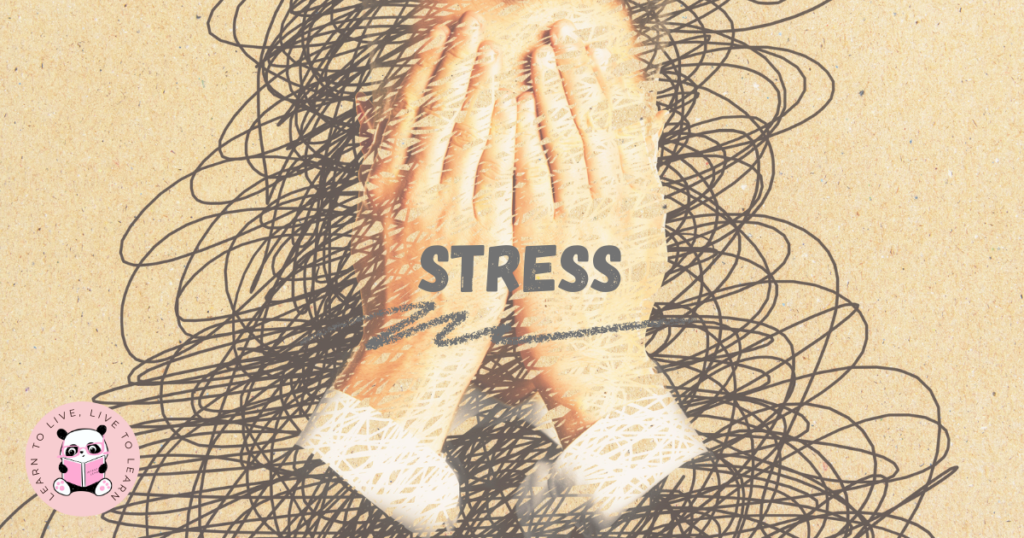15 Simple Methods To Better Cope With Stress
Written by Michelle Ong | May 1, 2024 | Productivity, Wellness

Discover 15 simple methods that can improve your ability to better cope with stress and elevate your quality of life.
In today’s fast-paced world, stress is like an unwelcome guest that refuses to leave, showing up at the worst times—like when we are juggling tight deadlines, dealing with personal issues, or just navigating the everyday chaos. Imagine that feeling of your heart racing as you rush to meet a deadline, or the tension that creeps up when you are stuck in traffic after a long day at work. We will explore helpful techniques and lifestyle tweaks in this post to better manage our stress levels.
1. Mindset Shifts
Changing how we think and perceive things and situations is key for handling stress better.
“It’s not stress that kills us, it’s our reaction to it.”
Hans Selye
Stress is a natural part of life, not an obstacle. Perceiving challenges as tight deadlines only stokes fears of losing control and panic, and poor stress management can even lead to inaction and stagnation. When we reframe our mindset by recognizing them as opportunities, we focus our attention on what we can do to solve the problem and move things forward.
Don’t let mistakes erode our self-confidence or allow guilt to overwhelm us. Remember to be kind to ourselves. Setbacks are inevitable. It’s our response, whether constructive or destructive, that actually matters. Practicing mindfulness, like enjoying a relaxing walk, to find calm in the chaos, allows us to respond to stressors with clarity and composure.
Other helpful ways include giving ourselves a pep talk like we would to a friend, shifting our focus from what’s going wrong to what’s going right, and cultivating gratitude by listing three things we are thankful for each day. These mindset shifts have a compounding effect and promote a more positive outlook on life, helping us handle stress better and lead happier lives.
2. Regular Breaks
“The time to relax is when you don’t have time for it.”
Sydney J. Harris
Scheduling and taking regular breaks throughout the day can greatly contribute to effective stress management. Breaks provide an opportunity to rest and recharge, preventing burnout and promoting overall well-being.
By breaking up your day with short breaks, you allow yourself time to step away from tasks, clear your mind, and return with renewed focus and energy.
It’s important to schedule these breaks strategically, such as taking short pauses between tasks or scheduling longer breaks during mid-morning and mid-afternoon to prevent fatigue.
Incorporating activities like stretching, getting a hot beverage, or simply taking deep breaths during breaks can further enhance their rejuvenating effects. By prioritizing regular breaks in your daily routine, you can maintain productivity, reduce stress, and improve overall work performance.
3. Meditate
Meditation is a powerful tool for managing stress. It helps calm the mind and body, allowing you to step back from the chaos of daily life and find a sense of inner peace.
By focusing on your breath or a mantra, meditation can help quiet racing thoughts and bring a greater sense of clarity and perspective. Over time, regular meditation can lower levels of cortisol, the stress hormone, and promote feelings of relaxation and well-being.
“You cannot always control what goes on outside, but you can always control what goes on inside.”
Wayne Dyer
Incorporating meditation into your daily routine can provide lasting benefits for your mental and emotional health, helping you navigate life’s challenges with greater ease and resilience. With consistent practice for just 13 minutes daily over 8 weeks, it has been scientifically proven to reduce stress.
So, make sure to schedule a few minutes each day for meditation to reap its stress-relieving benefits and cultivate a greater sense of calm and balance in your life.
4. Good Posture
Maintaining good posture plays a crucial role in stress management by reducing muscle tension and promoting proper breathing, which in turn calms the mind.
When we slouch or hunch over, it can create physical discomfort and contribute to feelings of stress and fatigue.
To improve posture, sit or stand up straight with your shoulders relaxed and your spine aligned. Avoid slouching or leaning forward excessively, especially when sitting for extended periods. If you catch yourself slouching, gently straighten up and roll your shoulders back.
Practicing mindfulness throughout the day can also help you become more aware of your posture and adjust as needed. Good posture habits can make you feel physically comfortable and mentally calm, which helps manage stress.
5. Physical Activity
Exercise is a great way to combat stress. Activities like dancing, stretching, working out or even just taking a walk can boost the release of a chemical called brain-derived neurotrophic factor (BDNF), which improves memory and information retention. This helps you remember past experiences and coping strategies that had worked effectively in similar tough situations, boosting your confidence and ability to handle stress. Also, it aids in organizing thoughts, prioritizing tasks, and reducing overwhelm and anxiety.
Exercise not only relaxes your body but also clears your mind and lifts your mood by releasing feel-good chemicals called endorphins. It also lowers stress hormones like cortisol and adrenaline, helping you feel calmer and more resilient.
Making exercise a part of your daily routine can greatly improve your well-being, making it easier to handle life’s challenges.
So, whether it’s a stroll outdoors, a yoga session, or hitting the gym, prioritize movement everyday to reduce stress and enhance both your physical and mental health.
6. Diet
A balanced diet is crucial for effective stress management. If you lack certain nutrients, it can increase the chances of mental health issues like anxiety, depression, and cognitive impairment.
Prioritize healthy foods and cut back on processed foods and sugar to reduce chronic stress. Foods high in omega-3 fatty acids, like salmon and walnuts, are great for brain health, while leafy greens such as spinach and kale provide important vitamins and minerals.
Also, limiting caffeine and alcohol can help stabilize your mood and energy levels, making it easier to manage stress.
Making these dietary changes part of your daily routine can lead to better mental and emotional well-being in the long run.
7. Sleep
Getting enough sleep is critical for handling stress effectively. When you sleep well, it helps your brain work better, makes it easier to remember things, make decisions, and keeps your mood in check.
Aim for around 7 hours of sleep each night to reap these benefits. The ideal amount of sleep can vary from person to person, so it’s important to figure out what works best for you and stick to it.
Research has shown that insufficient sleep can prevent you from thinking clearly and even affect your waistline.
For a better night’s sleep, make sure your room is cool and dark at night to help your body make the sleep hormone, melatonin. And take a walk outside within the first hour of waking up to soak in some sunlight. This helps regulate your body’s circadian rhythm for more restful sleep.
Making sleep a priority in your daily routine is key to feeling less stressed and more on top of things.
8. Support Network
Having supportive people like family, friends, and mentors around you is really important for managing stress. They provide emotional support, encouragement, and help you see things from a different perspective when things get tough. And reduce feelings of isolation and overwhelm.
Studies show that people with good relationships tend to feel less stressed and generally happier. So, it’s important to nurture meaningful relationships and surround yourself with people who care about you and who you can rely on in tough times.
9. A Simple Hug
A simple hug can work wonders in managing stress by triggering the release of oxytocin, often called the “love hormone,” which makes us feel comforted and connected. A hug can provide a sense of security and reassurance during stressful times. Whether it’s from a friend or loved one, hugs reduce stress hormones like cortisol and lower blood pressure, making us feel calmer. Whenever you feel stressed or anxious, giving or receiving a hug can instantly lift your mood and ease tension.
10. Music
Listening to music is a simple yet effective way to manage stress. Music has the power to soothe the mind, relax the body, and elevate mood.
Whether it’s calming classical melodies, upbeat tunes, or your favorite tracks, music can help alleviate stress and promote a sense of well-being. You can listen to music while commuting, during work breaks, or before bedtime to unwind and de-stress.
Creating playlists of songs that resonate with you or match your mood can enhance the effectiveness of this stress-relief technique.
So, whenever you feel overwhelmed or in need of a mental break, just plug in your headphones and let the music work its magic.
11. Forest Bathing
Forest bathing, or spending time in nature, is a great way to reduce stress. It a Japanese Zen concept that involves immersing yourself in natural surroundings like forests or parks. This practice has been proven to lower stress hormones and improve overall well-being.
Forest bathing also helps you stay present by focusing on the sights, sounds, and smells of nature, instead of worrying about past or future stressors.
To do it, simply take leisurely walks or sit and observe the sights, sounds, and smells of nature. Whether it’s a short stroll during your lunch break or a weekend hike, spending time in nature can help you relax and feel refreshed.
12. Journal
Journaling can be a powerful tool for reducing stress and processing emotions. Taking time to write down your thoughts, feelings, and experiences can provide clarity and perspective on challenging situations.
You can journal at any time that feels right for you, whether it’s in the morning to set intentions for the day or in the evening to reflect on what happened.
Integrating journaling into your daily routine can be as simple as setting aside a few minutes each day to write freely or using prompts to guide your reflections.
Whether you prefer pen and paper or digital journaling apps, the key is to find a method that works for you and stick with it.
13. Online Resources
You can find helpful tips for managing stress in podcasts and online articles that are free to access. Just make sure the sources are trustworthy and reliable. Listen to videos, podcasts or read articles from experts or well-known websites.
Spending a few minutes each day listening or reading can help you learn effective ways to handle stress. This can make a big difference in how you feel every day.
14. Showers
Using hot and cold therapy, either separately or together, can really help with stress.
Hot therapy, like hot bath or sauna sessions, relaxes your muscles, makes you feel calm, and improves blood flow, which can reduce tension.
Short cold showers can reduce swelling and wake up your nervous system, making you feel refreshed and less stressed. Studies have shown that regular cold showers totaling 11 minutes per week can make a big difference in stress levels, making you more resilient and healthier overall.
Some people find cold plunges particularly unpleasant and question their effectiveness, while others report wonderful improvements. To get the most out of the experience, ensure you are comfortable with it and tailor it to suit your body’s tolerance and preferences.
You can easily add hot and cold therapy to your daily routine by taking a cold shower in the morning to energize your body and mind and a quick hot one in the evening to relax muscle tension. This combination helps your body and mind feel better, reducing stress and improving your overall well-being.
15. Count Backwards
Last but not least, counting backwards, like from 5 to 1, is a simple but effective way to manage stress.
This technique helps clear your mind of negative thoughts and distractions by redirecting your focus, reducing anxiety and mental clutter. By focusing on the countdown, you regain control over your thoughts and emotions and feel calmer.
You can use this method whenever you feel stressed or overwhelmed, such as before an important presentation or when feeling overwhelmed with tasks, to quickly regain composure and clarity.
Make Self-Care A Priority
It’s important to note that none of these methods offer instant solutions or serve as medical advice. Simply doing them once won’t miraculously make you feel better. Instead, it’s about incorporating several techniques into your daily routine and sticking with them consistently to see results. Also, keep in mind that the effectiveness of these methods varies depending on the level of stress you’re facing—whether it’s short-term or long-term, minor or major.
Experimenting with different approaches and finding what works best for you allows you to gradually build resilience and better manage stress over time. Making these practices a regular part of your daily routine enhances your well-being and quality of life, creating stability and resilience to better tackle life’s challenges. Whether it’s meditation in the morning, a brisk walk at lunchtime, or journaling before bed. These can become comforting rituals.
Over time, these habits become second nature, empowering you to stay balanced and calm in tough situations. By making self-care a priority, you’ll find yourself feeling happier, healthier, and more able to handle whatever comes your way.
Like what you are reading? Pin & share this post with your family and friends and follow me on Pinterest for more daily inspiration!


